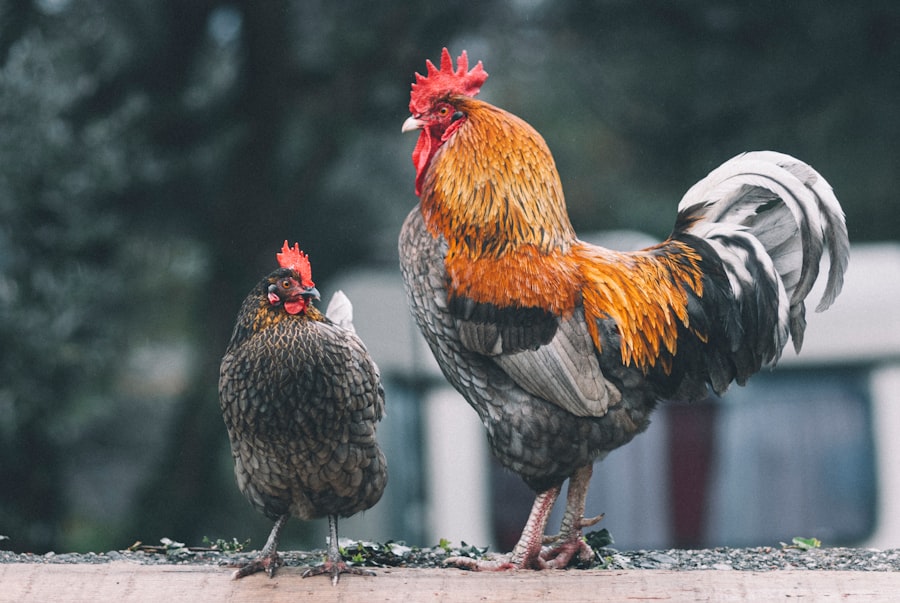Keeping chickens in your backyard has become a growing trend in recent years. More and more people are realizing the benefits of having these feathered friends right outside their door. Not only do backyard chickens provide fresh eggs, but they also offer natural pest control and fertilizer for your garden. In this article, we will explore the various benefits of keeping chickens, discuss city and state regulations for backyard chicken keeping, provide tips for choosing the right breed of chicken, offer advice on preparing your backyard and building a chicken coop, discuss feeding and caring for your chickens, address health concerns and disease prevention, and provide tips for collecting and using chicken eggs.
Key Takeaways
- Keeping chickens in your backyard has numerous benefits, including fresh eggs, natural pest control, and fertilizer for your garden.
- Before getting chickens, it’s important to research and comply with city and state regulations for keeping them.
- Choosing the right breed of chicken for your backyard depends on factors such as egg production, temperament, and climate.
- Preparing your backyard for chickens involves creating a safe and secure space for them to roam and providing adequate shelter and food.
- Designing and building a chicken coop requires careful consideration of size, ventilation, and predator-proofing.
Benefits of Keeping Chickens in Your Backyard
One of the main benefits of keeping chickens in your backyard is the abundance of fresh eggs they provide. There is nothing quite like gathering eggs from your own flock each morning. Not only are fresh eggs delicious, but they are also more nutritious than store-bought eggs. Chickens that are allowed to roam freely and eat a varied diet produce eggs that are higher in omega-3 fatty acids, vitamin E, and beta-carotene.
Another benefit of having backyard chickens is their natural pest control abilities. Chickens love to eat insects, slugs, and other pests that can damage your garden. They will happily scratch and peck at the ground, devouring any pests they come across. This can help reduce the need for chemical pesticides in your yard.
Chickens also provide excellent fertilizer for your garden. Their droppings are rich in nitrogen, phosphorus, and potassium, which are essential nutrients for plants. By allowing your chickens to roam freely in your yard or by using their droppings as compost, you can improve the health and fertility of your soil.
City and State Regulations for Keeping Chickens
Before getting chickens for your backyard, it is important to research and understand the city and state regulations regarding chicken keeping. Each city and state may have different rules and restrictions, so it is crucial to familiarize yourself with the specific regulations in your area.
To find the regulations for your city, start by visiting your city’s official website. Look for information on animal control or zoning ordinances. Some cities may have specific guidelines for the number of chickens allowed, coop requirements, and distance requirements from neighboring properties. It is also important to check if you need a permit or license to keep chickens.
State regulations may also come into play, especially if you live in a more rural area. Some states have specific guidelines for poultry keeping, such as biosecurity measures to prevent the spread of diseases. It is important to be aware of these regulations and comply with them to ensure the health and safety of your flock.
Navigating city and state regulations can sometimes be challenging. Some areas may have strict rules that make it difficult to keep chickens, while others may have more lenient regulations. It is important to be proactive and reach out to local officials if you have any questions or concerns. Building relationships with your neighbors can also be helpful, as they may have valuable insights or experiences with keeping chickens in your area.
Choosing the Right Breed of Chicken for Your Backyard
When it comes to choosing the right breed of chicken for your backyard, there are several factors to consider. Climate is an important consideration, as some breeds are better suited to cold climates while others thrive in warmer climates. It is important to choose a breed that can withstand the temperature extremes in your area.
Space is another factor to consider when choosing a breed. Some breeds are more active and require more space to roam, while others are content with smaller areas. If you have a small backyard, it may be best to choose a breed that is known for being more docile and adaptable.
Egg production is another important factor to consider. If you are primarily interested in having chickens for their eggs, you will want to choose a breed that is known for being a good layer. Some breeds, such as the Rhode Island Red or the Leghorn, are known for their high egg production.
Personal preferences also come into play when choosing a breed. Some people prefer certain breeds for their unique feather patterns or personalities. It is important to do your research and choose a breed that aligns with your preferences and goals for keeping chickens.
Preparing Your Backyard for Chickens
Before bringing chickens into your backyard, it is important to make the necessary preparations to ensure their safety and comfort. One of the first things you will need to do is provide a secure fence to keep predators out and chickens in. This can be done with chicken wire or hardware cloth, buried at least a foot deep to prevent digging predators from entering.
Predator-proofing your coop is also essential. Make sure there are no gaps or holes where predators can enter, and reinforce any weak spots. Install locks on doors and windows to prevent raccoons or other animals from gaining access. It is also important to provide adequate shelter for your chickens, such as a coop or henhouse, where they can roost and lay eggs.
Creating a comfortable environment for your chickens is also important. Provide plenty of shade and ventilation in the coop, as chickens can be sensitive to extreme temperatures. Provide perches or roosting bars for them to rest on, as well as nesting boxes for laying eggs. It is also important to provide clean bedding material, such as straw or wood shavings, to keep the coop clean and dry.
Designing and Building a Chicken Coop

When it comes to designing and building a chicken coop, there are several factors to consider. The size of your flock will determine the size of the coop you need. As a general rule of thumb, each chicken should have at least 4 square feet of coop space. It is also important to provide at least 10 square feet of outdoor space per chicken.
There are several different types of chicken coops to choose from, including stationary coops, mobile coops, and chicken tractors. Stationary coops are more permanent structures that provide a secure and comfortable environment for your chickens. Mobile coops, also known as chicken tractors, are designed to be moved around your yard, allowing your chickens to graze on fresh grass while still being protected from predators. Chicken tractors are a great option if you have limited space or want to rotate your chickens around your yard.
When building a chicken coop, it is important to consider your budget and personal preferences. You can choose to build a coop from scratch using plans or kits, or you can repurpose an existing structure, such as a shed or playhouse. It is important to ensure that the coop is well-insulated and provides adequate ventilation to keep your chickens comfortable.
Feeding and Caring for Your Chickens
Feeding and caring for your chickens is an important part of keeping them healthy and happy. Chickens require a balanced diet that includes a combination of commercial feed, kitchen scraps, and foraging opportunities.
Commercial feed is readily available at most feed stores and comes in different formulations depending on the age and purpose of your chickens. Starter feed is typically fed to chicks until they are about 6 weeks old, at which point they can transition to grower feed. Layer feed is fed to hens that are laying eggs, as it contains the necessary nutrients for egg production.
In addition to commercial feed, you can supplement your chickens’ diet with kitchen scraps. Chickens can eat a wide variety of fruits, vegetables, grains, and proteins. However, it is important to avoid feeding them anything toxic or harmful, such as chocolate, onions, or avocado.
Providing fresh water is also crucial for your chickens’ health. Make sure to provide clean water in a shallow dish or waterer that is easily accessible to your chickens. It is important to check the water daily and clean the dish or waterer regularly to prevent the spread of bacteria.
Cleaning the coop is another important aspect of caring for your chickens. Regularly remove soiled bedding and replace it with fresh bedding to keep the coop clean and odor-free. It is also important to regularly check for signs of pests or disease and take appropriate measures to address any issues.
Health Concerns and Disease Prevention
Keeping your chickens healthy and preventing the spread of disease is crucial for their well-being. There are several common health concerns that can affect chickens, including parasites, respiratory infections, and egg-laying issues.
Parasites, such as mites and lice, can cause discomfort and health problems for your chickens. Regularly inspect your chickens for signs of parasites, such as feather loss or excessive scratching. If you notice any signs of infestation, treat your chickens with appropriate medications or natural remedies.
Respiratory infections are another common health concern for chickens. These infections can be caused by bacteria, viruses, or fungi and can lead to symptoms such as coughing, sneezing, or difficulty breathing. If you suspect that your chickens have a respiratory infection, it is important to isolate them from the rest of the flock and seek veterinary care.
Egg-laying issues can also occur in chickens. Some hens may experience egg binding, where an egg becomes stuck in the reproductive tract. This can be a life-threatening condition and requires immediate veterinary attention. Other hens may experience egg abnormalities, such as soft-shelled eggs or eggs without shells. These issues can sometimes be resolved with dietary adjustments or supplements.
To prevent the spread of disease, it is important to practice good hygiene and biosecurity measures. Wash your hands thoroughly before and after handling your chickens, and avoid wearing the same shoes or clothing when visiting other flocks. Quarantine new chickens before introducing them to your existing flock to prevent the spread of any potential diseases.
Collecting and Using Chicken Eggs
Collecting and using chicken eggs is one of the most rewarding aspects of keeping backyard chickens. When collecting eggs, it is important to handle them gently to prevent cracking or breaking. It is also important to collect eggs regularly to prevent them from becoming dirty or attracting pests.
To store eggs, it is best to keep them in a cool and dry place, such as a refrigerator. Eggs can be stored for several weeks, but their quality will gradually decline over time. It is important to use older eggs first and discard any eggs that are cracked or have an off smell.
Fresh eggs are a versatile ingredient that can be used in a wide variety of recipes. They can be used in baking, cooking, or enjoyed on their own. Fresh eggs have a richer flavor and a brighter yolk color compared to store-bought eggs.
Conclusion and Final Thoughts
Keeping chickens in your backyard can be a fun and rewarding hobby. Not only do backyard chickens provide fresh eggs, but they also offer natural pest control and fertilizer for your garden. However, it is important to research and understand the city and state regulations regarding chicken keeping before getting started.
Choosing the right breed of chicken for your backyard is also important. Consider factors such as climate, space, and egg production when selecting a breed. Preparing your backyard and building a chicken coop are essential steps in creating a safe and comfortable environment for your chickens.
Feeding and caring for your chickens requires attention to their nutritional needs and providing clean water and bedding. Regularly cleaning the coop and monitoring your chickens’ health are also important aspects of caring for them.
Health concerns and disease prevention should be a priority when keeping backyard chickens. Practice good hygiene and biosecurity measures to prevent the spread of disease. Collecting and using chicken eggs is a rewarding experience that can be enjoyed in a variety of recipes.
In conclusion, keeping chickens in your backyard can be a rewarding and fulfilling experience. By following the guidelines and tips provided in this article, you can create a safe and comfortable environment for your chickens and enjoy the many benefits they provide. Whether you are interested in fresh eggs, natural pest control, or simply the joy of having these feathered friends in your backyard, backyard chicken keeping is a hobby that is worth considering.
If you’re considering keeping chickens in your backyard, you may also be interested in exploring the option of renting a chicken coop. Renting a coop can be a great way to get started with chicken keeping without the commitment of building or buying your own coop. Poultry Wizard offers a variety of rental options for chicken coops, allowing you to experience the joys of raising chickens without the long-term investment. To learn more about renting a chicken coop, check out their article on Renting a Chicken Coop.
FAQs
What are the benefits of keeping chickens in your backyard?
Keeping chickens in your backyard can provide you with fresh eggs, natural pest control, and fertilizer for your garden. They also make great pets and can teach children responsibility.
What are the legal requirements for keeping chickens in your backyard?
The legal requirements for keeping chickens in your backyard vary depending on your location. Some cities and towns have specific regulations regarding the number of chickens you can keep, coop size, and distance from neighboring properties. It is important to check with your local government before keeping chickens.
What kind of space do chickens need?
Chickens need a coop for shelter and a run for exercise. The coop should be large enough for the number of chickens you have and provide protection from predators. The run should be at least 10 square feet per chicken and have a roof to protect them from birds of prey.
What do chickens eat?
Chickens eat a variety of foods including chicken feed, grains, fruits, vegetables, and insects. It is important to provide them with a balanced diet and fresh water at all times.
What are the health risks associated with keeping chickens?
Chickens can carry diseases such as salmonella, so it is important to practice good hygiene when handling them. Wash your hands thoroughly after handling chickens or their eggs and avoid kissing or snuggling them.
How do you care for chickens in the winter?
Chickens can handle cold temperatures, but it is important to provide them with a draft-free coop and plenty of bedding to keep them warm. You can also provide them with a heat lamp or heated waterer to prevent their water from freezing.
Meet Walter, the feathered-friend fanatic of Florida! Nestled in the sunshine state, Walter struts through life with his feathered companions, clucking his way to happiness. With a coop that’s fancier than a five-star hotel, he’s the Don Juan of the chicken world. When he’s not teaching his hens to do the cha-cha, you’ll find him in a heated debate with his prized rooster, Sir Clucks-a-Lot. Walter’s poultry passion is no yolk; he’s the sunny-side-up guy you never knew you needed in your flock of friends!







